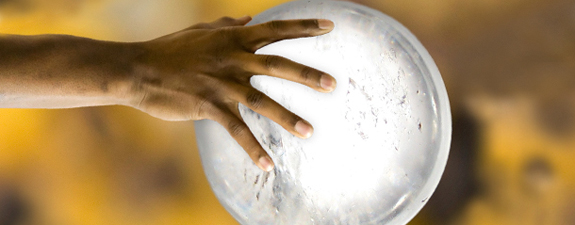How will technology change our electoral process? Fast Company gets Crystal Ballin' with Keya Danenbaum, the founder of ElectNext, which applies the techniques of dating websites to representative democracy.

What is ElectNext?
We like to call it eHarmony for elections. When most people go out to vote, they know who they want for president or the top of the ticket, but when they walk into the booth, the ballot is three pages long, and it’s instantly overwhelming. What most people do is vote in some arbitrary way, either by voting for a party all the way down, or by looking for names they like or that sound familiar. We think that technology is in a place where it can assist us to do better than that. We ask you questions so we know where you stand on issues, then we show how each candidate uniquely aligns with you. We launched on November 8th of this year, election day, and we have just over 2,000 users on the site so far.
A dating website, but for politics? Isn’t that kind of trivial?
Not at all. First of all, is there anything more important than finding your match for life? Not really. But in more seriousness, voting is the way we exercise our approval or disapproval of our representative leadership and the way the country is being run, and if we’re not exercising that right with information and knowledge, then it’s a waste.
Why not call it the OkCupid of politics? It’s free, after all.
It actually is the OkCupid of politics. There’s a Q-and-A format, and one of the next features we’re rolling out is a crowdsourcing questions feature. It’s very much like OkCupid, and we started out saying we were an OkCupid for politics, but we found OkCupid resonates more with a younger age group, but not so much with people outside of it.
So it was a strategy for VC pitch meetings.
Basically.
It sounds like you’re saying democracy has a user interface problem.
I would totally agree with that. The user experience of ElectNext is really core to the value that we’re trying to offer the American voter. We want this to be a very clean, simple process.
[youtube fUyllcbieTY]
How did you get the idea for the site?
In 2008 I did presidential campaigning, then in New Haven I ran the mayor’s reelection campaign in 2009. Then I moved to Philadelphia to go to business school in the fall of 2010, and I got so caught up in the program that I missed the voter registration deadline. I couldn’t vote. It was such a disappointment. If it was this hard for me to stay on top of this, then it’s this hard or harder for everyone else.
How do you plot exactly where candidates stand?
We have five sources of data. First, candidates are welcome to come on and respond directly to our questions. We have an in-house team that reads websites and policy papers. We take interest group ratings into account. We crowdsource a component of this. And we expert-source some of this, partnering with think tanks and other such groups.
You're focusing on the issues.
Our electoral process is dominated by a song-and-dance process. It’s ads and sound bites, big speeches with lots of platitudes, who do you like better, who would you want to have a beer with.
You don’t have questions about beer on ElectNext?
 We get asked that all the time. “We only get matched based on issues, but I want to know about personality, who’s going to be a good leader.” The answer is, we don’t have that on our site. We’re trying to offer something you can’t get elsewhere.
We get asked that all the time. “We only get matched based on issues, but I want to know about personality, who’s going to be a good leader.” The answer is, we don’t have that on our site. We’re trying to offer something you can’t get elsewhere.
You stand to acquire lots of data on the political leanings of Americans. Could you someday use that data like a pollster?
The data on individual users we don’t share with anyone. But the way we foresee using all this information we’re collecting is exactly as you say, eventually to aggregate that and say something really interesting in a poll type of report.
Many people believe our political system suffers from dysfunction. How much of that is hackable by technology?
For things like corruption, the antidote seems to be transparency, which is something technology can absolutely help with. When you said dysfunction, I immediately thought of Congress today, which is entrenched in party politics. I think that ElectNext or other cool innovative political startups do have the opportunity to change that framework. On ElectNext, we don’t offer party information. You can’t find out what party a candidate is with, you can only find out how you align on the issues.
Could technology enable direct participatory democracy? If in the future, everyone has a connected device, couldn’t everyone vote directly on legislation?
Technology would certainly be able to enable it. But I don’t know how likely it is to become a reality here. Disrupting that representative structure would be really difficult. It’ll be a little ways before the overall hierarchies we participate in today would get disrupted.
Will voting in elections itself go digital?
I think it’s definitely going digital. “Crystal ballin’” into the future, will this all move online, on mobile? I think it will, I think it has to.
Last year we ran a story about how Google got some polling places wrong. Isn’t voting something that’s too important to rely on technology for?
It’s the exact opposite: It’s too important not to. Our banking systems are all computerized and online.
What are some of those other innovative political startups you’re excited about?
SeeClickFix is a New Haven startup. They have relationships with the city’s government, and allow you to report an abandoned car, or potholes, so the government can be immediately responsive. PopVox and OpenCongress present legislation to users and give them the opportunity to vote it up or down, say why, and then send that to your congressperson. The Sunlight Foundation is doing such interesting things. I downloaded a browser plug-in: Now any page I’m on, if [the plug-in] can recognize a company’s name on the page, it will tell me the split of political donations to the left and right.
I note from your staff page that ElectNext itself is decidedly bipartisan. You match Obama, while your CTO and cofounder Paul Jungwirth matches Michele Bachmann.
The work environment is fantastic; we get along on absolutely everything, with diametrically opposed political views. We don’t get heavily into politics too much, just because we’re busy.
Time to look into the crystal ball. How will technology alter politics in the next year?
I think most of the innovation will be in how campaigns run their organizations. There’s a startup called BlueFusion [recently renamed Amicus] that’s mashing up Facebook data with voter registration data, so what a campaign can do, when it's going door to door, is figure out who a supporter’s Facebook friends are, and get people to use their social networks to continue to ID supporters. Another startup, Grassroots Unwired, helps campaigns process in real time the data volunteers are getting at doors, so they can more dynamically deploy people to get out the vote.
How about the next five years?
What I hope we’ll be seeing are ways of bringing people from opposite perspectives together through technology. The whole field of deliberative democracy--we need to get back to the town hall side of things. When we have discussions, we find common ground, and we find ways to achieve goals in a compromised way and move forward together and learn.
How about in 25 years?
Really taking a step back, our system is pretty good, right? I mean, we do get to show up, we do get to vote, we get to have our say, there are peaceful transitions in power. Taking a broader view, fundamentally the mechanisms we use to run this country are pretty strong. Twenty-five years from now I wouldn’t really hope for radical changes. Maybe we’ll have more parties.
For more interviews from our Crystal Ballin' series, click here.
Follow Fast Company on Twitter.
[Image: ElectNext]